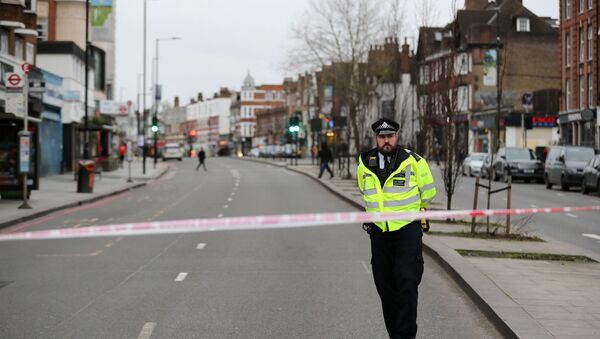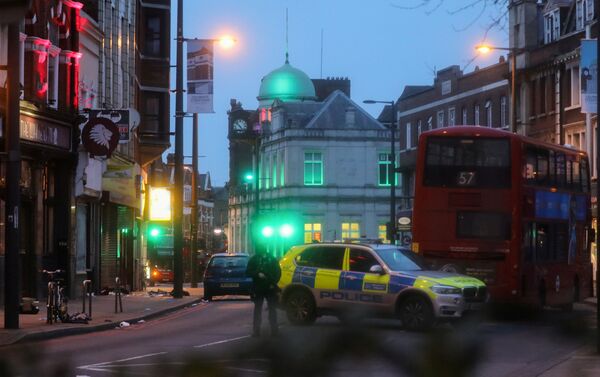On 3 February, UK Prime Minister Boris Johnson reiterated his vow to toughen rules for convicted terrorists, preventing them from early prison release in the aftermath of a Sunday stabbing spree in Streatham, south London, which left three people injured.
The knife attack committed by Sudesh Amman, who served half of his sentence in 2018 for "Islamist-related terrorism offences" and had been freed shortly before the Streatham violent act, followed the London Bridge assault in November 2019 conducted by convicted terrorist Usman Khan, released from prison on licence in December 2018.
"If you are convicted of a serious terrorist offence, there should be a mandatory minimum sentence of 14 years - and some should never be released," Johnson stated in the wake of the London Bridge attack that resulted in the deaths of two people with another three being wounded.
Why UK Needs Terror-Specific Sentencing Laws
On 21 January, the British government announced new measures envisaging tougher sentencing and an end to early release for convicted terrorists. Being confirmed by Home Secretary Priti Patel and Justice Secretary Robert Buckland QC, the new Counter-Terrorism Bill, which is expected to be introduced in the first 100 days of the Johnson government, will:
· "force dangerous terrorist offenders who receive extended determinate sentences to serve the whole time behind bars";
· "ensure those convicted of serious offences such as preparing acts of terrorism or directing a terrorist organisation spend a mandatory minimum of 14 years in prison";
· "overhaul the terrorist licensing regime, doubling the number of specialist counter-terrorism probation officers and introducing measures such as polygraph testing", according to the government website.
Dr David Lowe, a senior research fellow at Leeds Beckett University’s Law School, who runs a consultancy business in terrorism and security, explains that the issue preventing British authorities from keeping dangerous convicts behind bars to serve their full sentence is related to the scrapping of Imprisonment for Public Protection orders (IPP) in 2013.
"IPP’s were introduced in the Criminal Justice Act 2003", recalls Lowe. "While the Act still allowed, where applicable, for most offenders to be released half-way through their sentence, it introduced IPP’s for sentences delivered by the courts with no fixed end, that is where the judge has not recommended the prisoner serve a minimum period if the prisoner was considered to be dangerous. For dangerous prisoners, the Act laid down provisions for dangerous prisoners to be reviewed by a specialist parole board."
The researcher points out that the Criminal Justice and Immigration Act 2008 removed the parole board process. However, it still allowed judges to deliver life sentences or IPP’s for dangerous offenders until IPP’s were eventually scrapped with the introduction of the Legal Aid, Sentencing and Punishment of Offenders Act of 2012, Lowe adds.
"Although it [2012 Act] reintroduced the role of the parole board, in essence the Act virtually made it compulsory that the likes of terrorist prisoner be released after serving half of their sentence", the scholar stresses. "It is the 2012 Act that the authorities still have to follow and it is legislation the current UK government is looking to repeal".
According to the researcher, it is the London Bridge attack and the Streatham stabbing spree committed by individuals being imprisoned for terrorism-related offences and released at the half-way point of their sentence "that has brought this issue of concern to a wider audience".
"The UK Criminal Justice System has a responsibility to keep us all safe and it is important that they differentiate between terrorist prisoners who are so deeply imbued with their cause from those who have been on the periphery, as the former are the ones who pose a danger to society should they be released", Lowe emphasises.
Philip Ingram, a former British senior intelligence and security officer, echoes Lowe by saying that while "terrorism crimes and terrorist-related offences are subject to the criminal justice system in the same way as all other crimes", they are usually driven by a completely different incentive.
Although a number of pieces of British legislation effectively allow all prisoners to be automatically released on license completing half their sentence, "those prison regimes are designed to deal with criminals and not necessarily terrorists with different motivations and goals", Ingram highlights.
"The only real countermeasure is to recognise that certain terrorists are not motivated in the way criminals are and to have terror specific sentencing laws, this has partly been implemented in the Counter Terrorism and Border Security Act of 2019 where automatic release has been stopped for those convicted under that act, but not for those convicted before it came into power", the ex-intelligence officer underscores.





